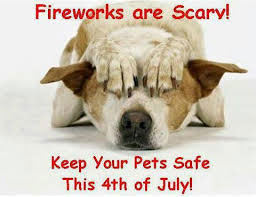Pet safety on the 4th of July, isn’t always at the forefront of our plans with all the fun and activities, so injuries can occur. Prevention is always the best first aid. But, with all the bar-b-ques and fireworks a burn or injury to your best friend on this holiday is a real possibility.

Here are some first aid tips for your pets safety.
First, never put any types of creams, ointment, butter or another home remedy on your pet’s burn. These can introduce bacteria and other bad stuff to the wound. Simply cool the burn with water for at least 10 minutes.
For more severe burns cover the burn with either a dry sterile dressing or one of our burn gel dressings. Then transport your pet immediately to the nearest veterinarian.
Just like us humans, our pets can become victims of extreme heat leading to vomiting, diarrhea, and heat exhaustion. Consider avoiding strenuous activities and keeping your pets indoors with air-conditioning during the heat of the day and with access to plenty of fresh water.
If your pet does become overheated, cool them down by spraying them with cool or room temperature water, but never ice water. Ice cold water can cause a shock by constricting blood vessels and blood flow to the skin so heat won’t be able to escape, causing the heat exhaustion to get worse.
Along with physical injuries comes the risk of anxiety due to the loud noise from fireworks and a household full of friends and relatives. Make sure if they become frightened they can’t run away by always keeping them on lease or in their kennel where they can feel secure. Sometimes placing a blanket over their kennel can make them feel safer. Consider having some ambient noise such as a fan, TV or music to drown out the outside noise.
With holidays always comes with fun food. Make sure your pets don’t have access to alcohol, caffeine, chives, chocolate, garlic, grapes, macadamia nuts, onions, and raisins which all cause harm.
Remember you are responsible for your pet’s safety in an emergency and a disaster so always be prepared in advance. Check out our Pet Disaster Survival Kit.


